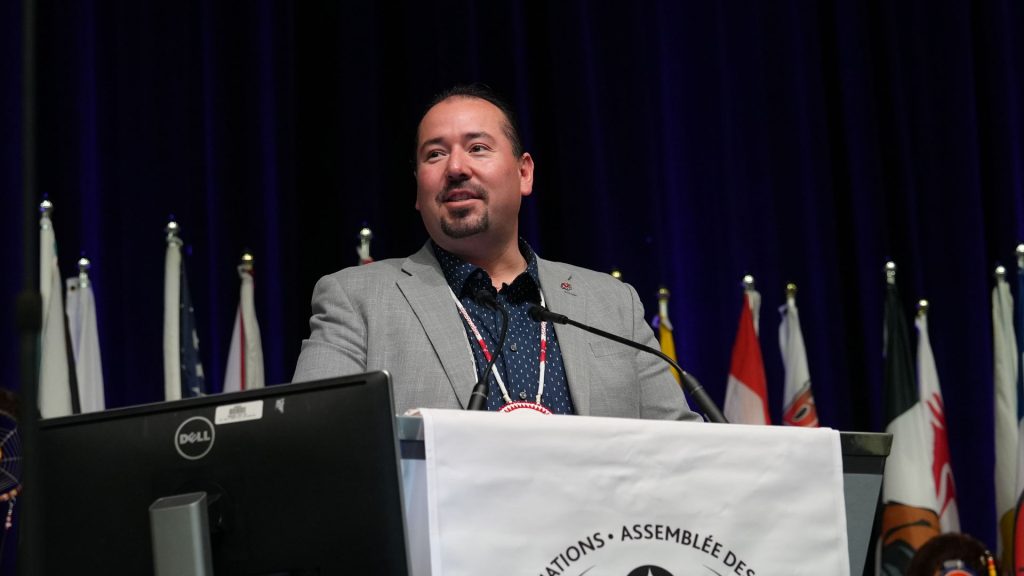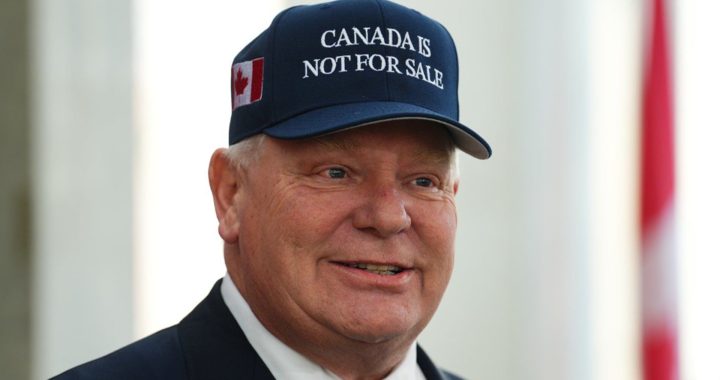
Abram Benedict at the AFN gathering in Ottawa in December. Photo: Mark Blackburn/APTN.
First Nations groups that worked together for more than a decade to fix racism in the on-reserve child welfare system now seem to be split on how best to make that happen.
The latest salvo comes from the Nishnawbe Aski Nation (NAN) and Chiefs of Ontario (COO), two organizations negotiating an agreement on child welfare reforms with the federal government.
On Thursday, the two groups responded to the latest legal skirmish between Indigenous Services Canada and chiefs outside Ontario who want to re-open negotiations.
“We as Chiefs of Ontario and Nishnawbe Aski Nation are engaging in productive and positive discussions with Canada on moving towards a reformed system for our children and families,” said a release from Ontario Regional Chief Abram Benedict and NAN Grand Chief Alvin Fiddler in a joint press statement.
“We have been mandated by our Chiefs, who have the right to make their own informed decisions about their children, and child and family services, without being required to consult with other parties on these decisions.”
The statement was made in response to news that the First Nation Child and Caring Society (Caring Society) filed a new legal motion with the Canadian Human Rights Tribunal (CHRT).
According to executive director Cindy Blackstock, the aim is not to interfere with Onatio’s negotiations. Blackstock said the goal of the motion is to get the CHRT to order Indigenous Services Canada to the table with chiefs outside Ontario.
“ We do want to know what’s going on with Ontario, with Canada, because whatever happens there may have implications for the rest of the country, but at this point, we are simply saying to Canada that you need to talk to everybody, because every child matters, not just children in one region that happen where there happens to be more of an agreement by the leadership with the terms that Canada put out,” said Blackstock
The CHRT is the quasi-judicial body that held a decade’s worth of hearings in a discrimination case against the federal government launched by the Caring Society and the AFN. NAN and the COO had standing at the hearings.
In 2016, it ruled that Canada discriminated against First Nations children in the on-reserve child welfare system by “willfully” and “recklessly” underfunding its programs.
It ordered Canada to reform the system. The Assembly First Nation (AFN), NAN and COO negotiated what is called the Final Settlement Agreement. But the deal was voted down by a majority of chiefs at an AFN gathering in October 2024.
That’s when NAN and the COO decided to go alone. The federal government announced that it would only negotiate with chiefs in Ontario – and no one outside the region.
A draft of the latest legal motion was put before the national Children’s Chief’s Commission (CCC) before it was filed. The CCC is a national body, formed out of a resolution at the AFN to negotiate what they hope will be a better deal.
Yet chiefs in Ontario are concerned about what the motion might mean for their negotiations.
“The Caring Society has opposed this agreement from day one, and we do not want their latest procedural interruption to disrupt our progress towards a regional agreement they have already deemed to be “deeply flawed,” noted Benedict and Fiddler in their joint statement.
“Our Chiefs have rejected the status quo and given us a strong mandate to reach an agreement to reform what continues to operate as a broken system for our children and families.”
The COO and NAN had standing in the case and were key in negotiating the Final Settlement Agreement. The Ontario groups supported and ratified the reforms.
But the agreement was rejected by a majority of Chiefs at a AFN Special Assembly in Calgary.
The teams who went before the CHRT coordinated well for more than a decade, but tensions are rising as fears of an election, and possibly a new government could unmake years of work and force matters back to square one.
AFN National Chief Cindy Woodhouse Neepinak has not responded to requests for comment on the unfolding of events since the special chiefs assembly in December.
She had originally urged chiefs to accept the deal but agreed to support their decision when they voted to reject it.
Neepinak did however send a letter to the Caring Society, which has been circulating among a small group of interested parties, and was leaked to APTN News.
“The AFN remains quite concerned with recent developments, particularly if any of the financial commitments under the Agreement-in-Principle or the Draft Final Agreement will continue to be secured for First Nations children and families moving forward,” wrote Neepinak.
“In light of these uncertainties, compounded by the current state of government and likely election in the short-term, I would certainly appreciate any clarity you can provide in relation to efforts to end the discrimination to which our children have been subjected to for so long.“










